Why Can't We Have a Populism That Builds?
El Salvador's Nayib Bukele, a darling of the American right, markets himself very differently from American populists.
Nayib Bukele, president of El Salvador, became a media sensation after releasing videos showing him transporting gang members he’d arrested to a new prison. He essentially just rounded up everyone who was in a gang, plus others caught up in his dragnet, and locked them up - saying he was throwing away the key.
While criticized by international human rights organizations, his moves helped break the back of violent crime in the country. Once a country with one of the highest homicide rates in the world, El Salvador (pop 6.3 million) now has fewer murders than Indianapolis (pop 1 million). Bukele has a 90% approval rating and is the darling of Latin American politics.
I wrote an article earlier this year warning people not to overly praise Bukele. Virtually none of us have been to El Salvador. We don’t know what’s really going on there. I can see that Bukele deliberately uses fascist style imagery on his social media. And he appears to have circumvented the law to enable him to run for re-election. So I am not someone who is a member of Team Bukele.
Bukele used to run his family’s marketing company. And he’s very clearly a highly effective marketer. Candidly, his videos of what he is doing in El Salvador are far more well done and effective that the marketing materials of most major US cities.
So while we don’t know the reality on the ground in El Salvador, what we can do is assess how he markets himself and his programs. That’s what I want to do here. Again, this is limited to his pitch, not a judgment on what he’s actually accomplished, which I don’t have direct knowledge of.
While Bukele is most famous for his gang crackdown, what I find most interesting are his series of social media videos touting public investment in El Salvador. He is clearly very keen to portray himself as a master builder, someone improving physical infrastructure and public goods and services that benefit the people of El Salvador. His videos are subtitled in English, so he is also clearly hoping for international attention, which many of them have gotten.
In one video called “Collective Inheritance,” he lays out his philosophy of investing in public goods. He says (somewhat edited for space):
When we were in the Mayor’s Office, in San Salvador, we were talking about the renovation of the plaza. And I remember that the budget was an investment of around one million dollars. An ARENA party city councilor at that time said it was too expensive, that a plaza like that could be renovated with $100,000. I said, “Of course. You could do it with just $10,000. It’s a matter of what you are going to do with those $10,000, $100,000 or $1 million.” We want to have a first rate plaza.
So he asked for the numbers and detailed expenses…He asked, “Why are we going to install marble? Why granite? Why not just cement it and paint it?” I asked him what his kitchen countertops were made of, if they were painted cement or not. He said, “Well obviously I have better materials there.” And the question is, if that’s good enough for your family, why isn’t it good enough for the rest of Salvadorans? He said because one is private, the other is public.
I said, before, in ancient Greece and Rome, the public spaces were the best. If you look at the ruins of the homes of the nobility, there were certainly nice homes, but they were nothing compared to the luxury of the Parthenon or the Senate or the public plaza…The public spaces were the best. And one reason was because it was a collective inheritance. We all have a private inheritance. But what is our generation going to pass on for the next generation? We want the best, as if it were for our children.
This rhetoric reminds me of former Bogota mayor Enrique Peñalosa, who undertook a public improvement campaign in his city, being especially noted for his bus rapid transit system. Peñalosa, also something of an international darling, would say things like the mark of a great city is not when the poor have cars but when the rich ride public transit.
Bukele has fired off a series of videos on various capital projects. His most recent is about a new National Library.
He also christened a new hydroelectric dam, a project he claims he got finished after years of corruption and incompetence by his predecessors. Note that he does not mention carbon reductions at all in his talk, but instead emphasizes how he’s cutting electricity rates thanks to this new cheap power source.
He also boasts of new roads built or paved.
New hospitals starting construction.
And a new airport terminal.
Watching how Bukele sells his program, I’m struck by what a contrast it is with many of the US populists who praise him. Again, I don’t know about the reality on the ground, but this is what he thinks resonates with people. And looking at he view counts on his videos, he’s right about that.
What US populist in recent times has ever built anything? Has delivered tangible benefits through improved public goods and services? I can’t name any.
Donald Trump came into office in part touting himself as a builder. Rebuilding Wollman Rink in Central Park in just a few months after the city had spent years making no progress was just one example of the Trump mythos about himself. But the one tangible thing he promised to build as President was a wall - and he didn’t build it, much less make Mexico pay for it. He couldn’t get an infrastructure bill passed either, something even Biden was able to do.
Frankly few Republicans in America, populist or not, have any agenda for rebuilding the country and delivering on tangible physical improvements that benefit their constituents’ lives.
The Democrats, of course, also can’t seem to build anything, being completely captured by various constituencies that make it impossible for them to do so.
By contrast, old school populists used to actually promise things like this - and deliver on them. Former populist governor of Louisiana Huey Long built a lot:
Huey Long, and his followers for 30 years after his death, pushed for an unprecedented expansion of governmental services in education, transportation and health. The anti-Longs, fiscal conservatives, opposed his plans to increase severance taxes on natural resources, to pave thousands of miles of roads, to provide free textbooks, to build a new state capitol, and to establish an extravagantly grandiose regime without sound financing….Long's single-minded use of power not only strengthened the executive branch, it helped him achieve his goals. His highway program built almost 13,000 miles of roads. All schoolchildren received free textbooks whether the communities wanted them or not. Funding for LSU and the Port of New Orleans greatly increased. Long expanded the Charity Hospital System, built LSU Medical School and brought natural gas to New Orleans.
FDR was also a populist, someone who went against his own upper class with the New Deal (and just by being a Democrat) and who connected directly with the people via radio and such. His programs like the WPA, PWA, and CCC built a huge amount of public goods and infrastructure that we will rely on today. My family just spend the time after Thanksgiving at one of Indiana’s state parks that benefitted from CCC projects, for example. This is one reason I say what we need in American today is a new FDR (but with the right agenda for today’s challenges).
Bukele, whatever his faults, identified citizen demand for tangible, physical improvements in public goods and services. It doesn’t take a Central American strongman to build libraries, roads, parks, etc.
This lack of any vision for public infrastructure, goods, and services is a missing gene in American conservatism. Until that’s corrected, it won’t much matter if Republicans are elected or not. We need to discover again how to become a country that builds and can accomplish things.


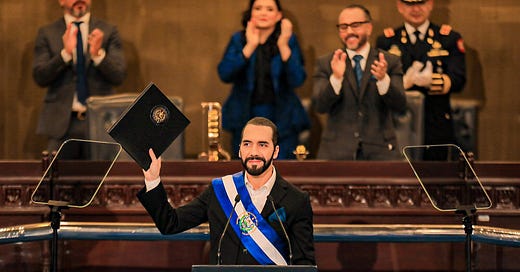


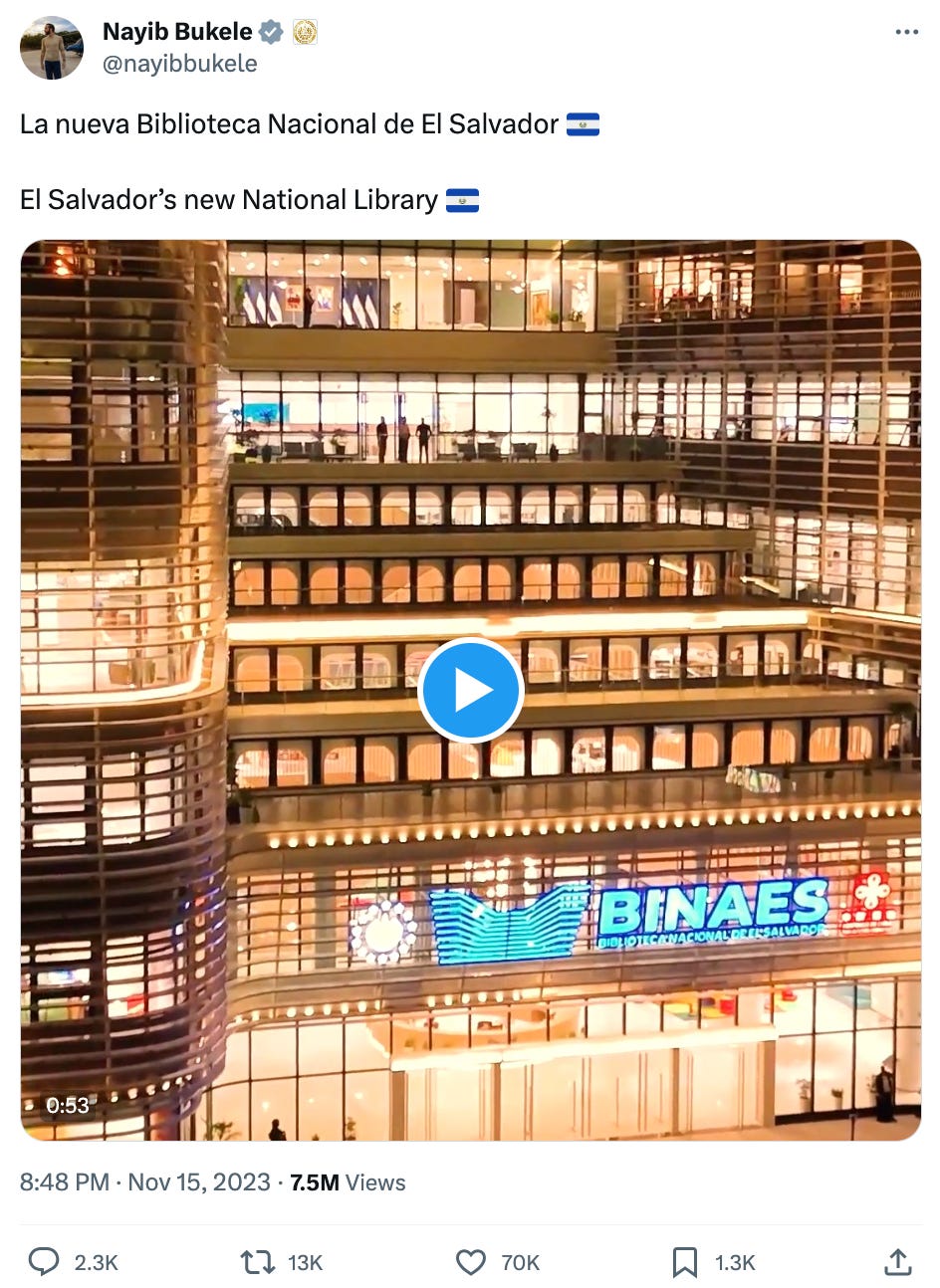
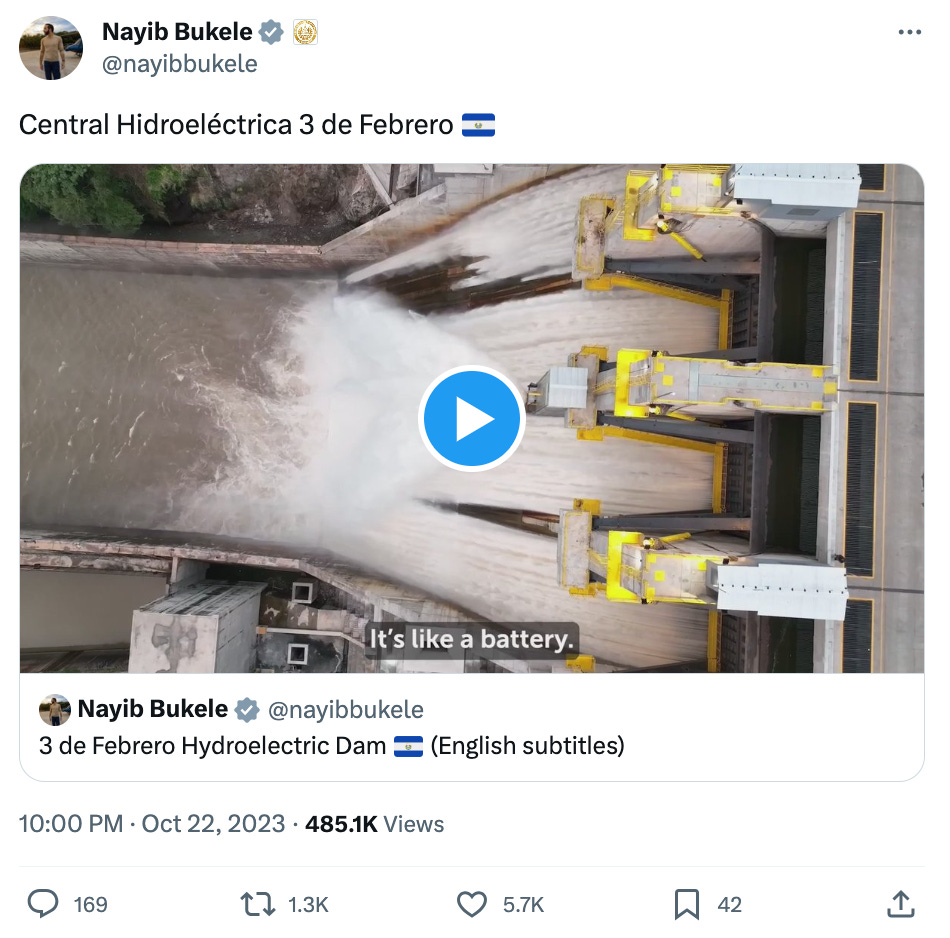
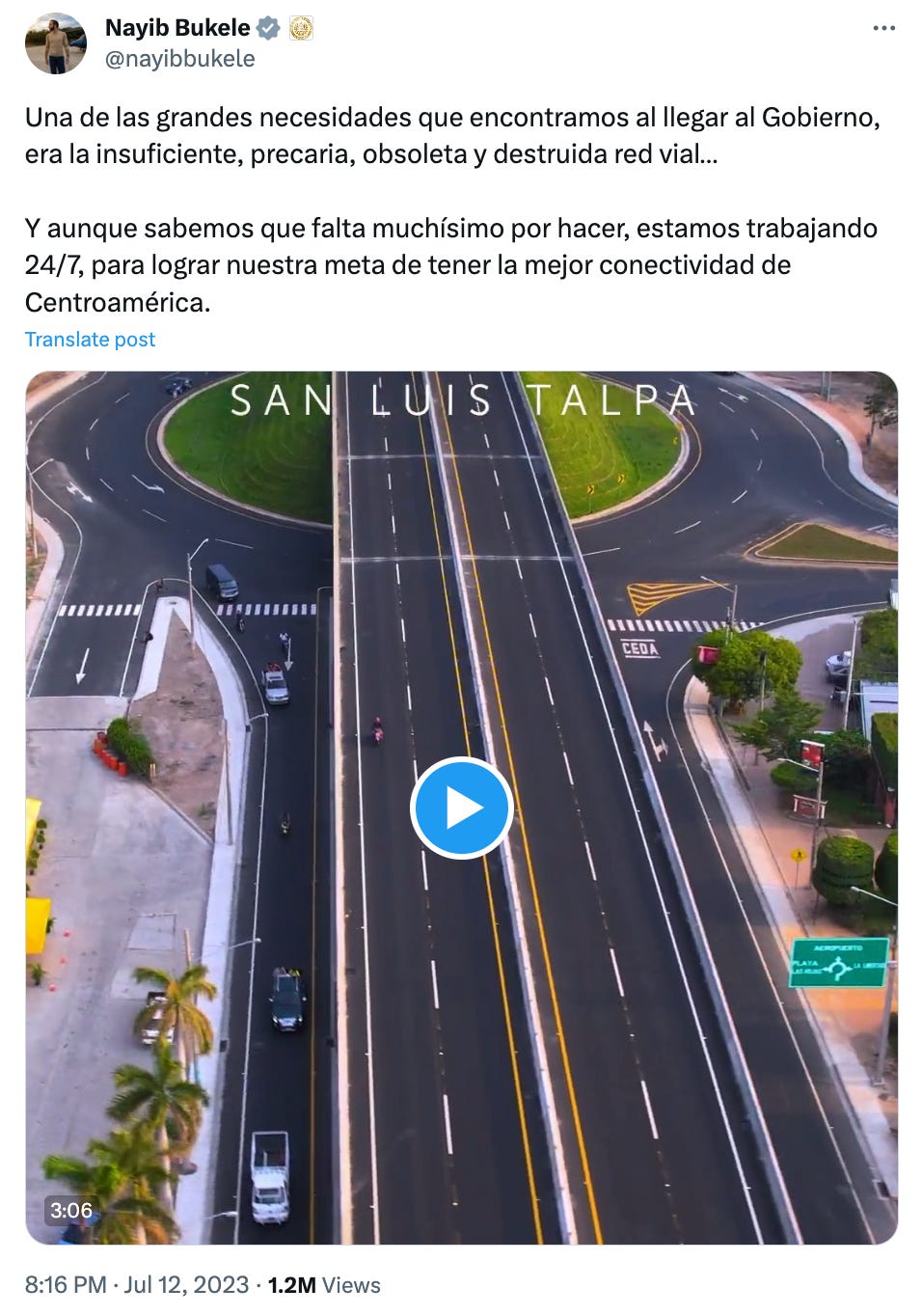
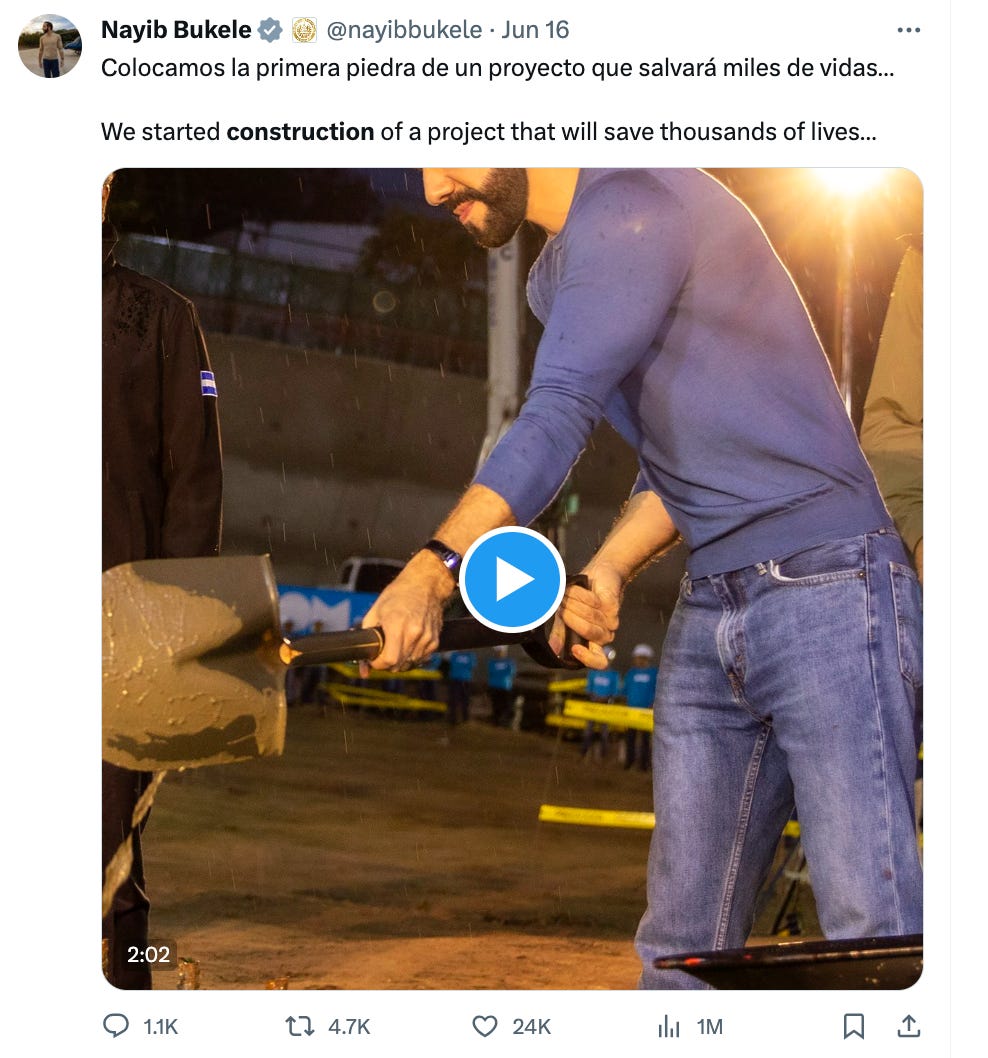
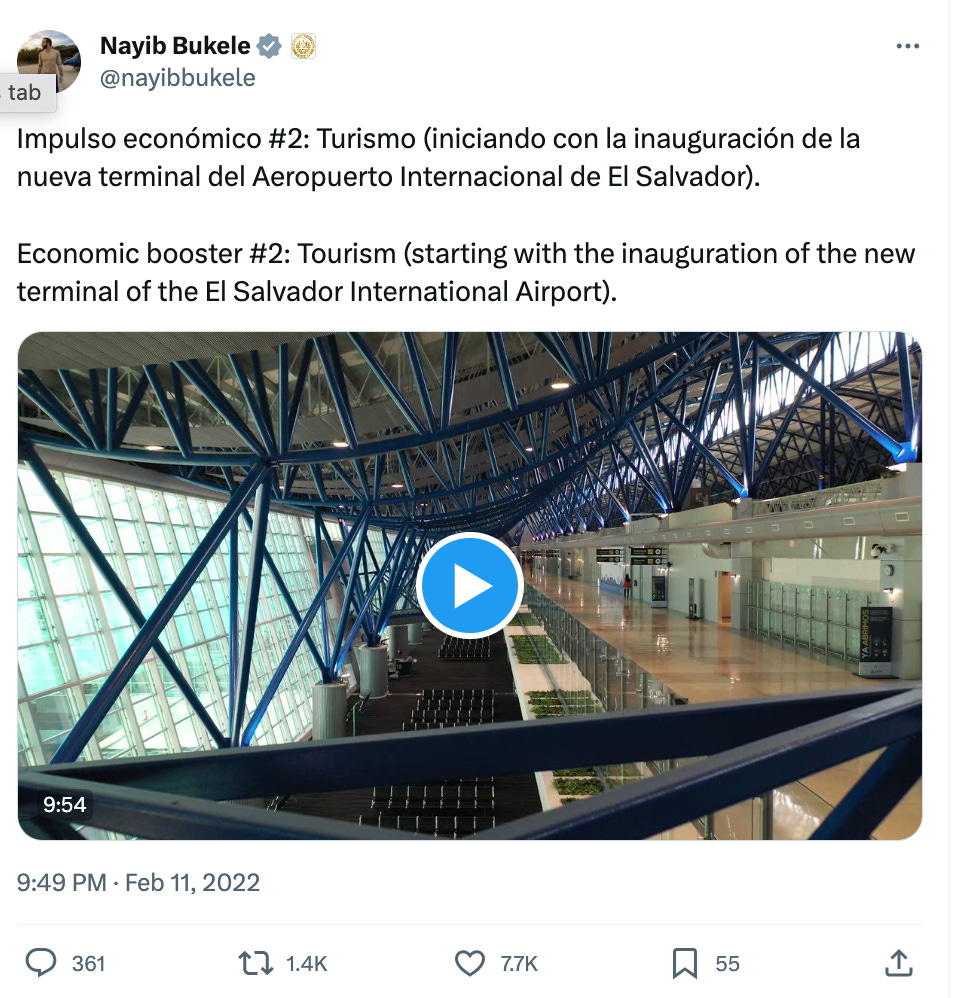
Here's what I think I hear you saying: "We want nice things, too. Why can't we have them?"
I empathize with that. When I visit other countries, or a handful of cities here, I come away wanting all the nice public amenities I see. We've had a serious downgrade in the quality of public goods over the last half-century, and perhaps longer. The public spaces and buildings built in my city from the 1880s-1920s is far superior to most anything in recent years. When we do build something new that's nice, it seems to be extraordinarily expensive - far beyond what I'd expect.
The question is, how do we get them without also leading to a bloated, corrupt administrative regime?
It seems to me we're in a populist moment now that is questioning the entire foundation of the administrative state we've built the last 100 years. I think that's good. Much of it is bloated and corrupt. But there's certainly a challenge implicit in your writings - what happens afterwards? If a lot of that gets torn down, what replaces it? Society will still need some sort of management of public space and shared spaces/features.
I think these are great questions to explore. So much of what we have today just flat-out doesn't work. It needs to be replaced. But what's the positive vision that replaces it all? I sense there are some good answers in much smaller-scale place management and localism. I think a wider embrace of decentralization of much of life will be good for us. But it's important for promoters of grass roots or bottom-up efforts, like myself, to articulate how we get to a society that provides really quality results for the majority.
This article really drives home a potential fear of mine, and I’m glad it was brought up.
I’m not sure Republicans can truly access a populism that builds so long as Trump is president. President Trump started his presidency claiming and touting he had “the best people”, and I genuinely agreed. The cabinet he put together seemed to be first rate and like it could accomplish some pretty impressive things. But it seemed like over time, he lost them all through what can only be described as his own personal failings.
Now, Trump and the Heritage Foundation are really going to try to implement a form of populism, but I’m not convinced. Schedule F seems like a plan to overhaul many portions of our government, but I think there is a sizable chance it could be a disaster for the Republican Party and the country.
If we think about rebuilding from a pure resource perspective, I think it’s easy to think about money/materials, as referenced from the example of the plaza. But it’s also about attracting really intelligent/talented people to solve future problems. If leadership starts from the top, what will the new “foot soldiers” of Schedule F look like?
I’m worried that 7ish years of Trump has driven away many intelligent conservatives away from politics, and only drawn in half-rate people with a bone to pick with “the libs”. If Trump is re-elected, I pray I’m wrong.